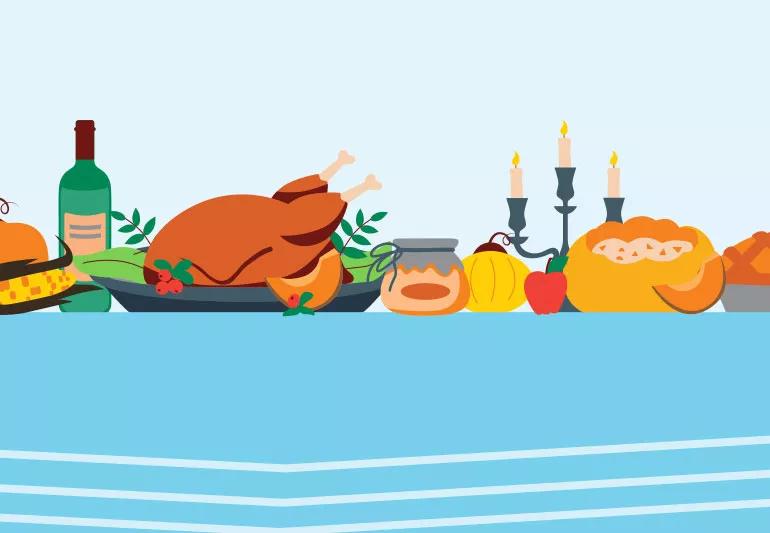Eating turkey is only a small part of the reason you want to take a nap

Image content: This image is available to view online.
View image online (https://assets.clevelandclinic.org/transform/3122d1ca-ac17-455e-94b8-e25a2cebf01e/Thanksgiving-Food-1725648588_770x533_jpg)
Dining table loaded with Thanksgiving food.
It’s Thanksgiving in the U.S. The dining room table is overflowing with all the trimmings — mashed potatoes, sweet potato casserole, stuffing (or dressing), cranberry sauce, dinner rolls and of course, the star of the show, the glistening, golden turkey.
Advertisement
Cleveland Clinic is a non-profit academic medical center. Advertising on our site helps support our mission. We do not endorse non-Cleveland Clinic products or services. Policy
You tuck into a full plate, excited and overwhelmed by all the wonderful food at your fingertips. Thank goodness you wore your stretchy pants — you’re going to need them.
Whether you clean your plate or leave a few forkfuls of Brussels sprouts behind, it doesn’t take long before you start to crash. You’re sleepy, sluggish, lethargic and feel like you can’t eat another bite (but wait, there’s three kinds of pumpkin pie, a pecan pie and Grandma’s cookies). Yikes.
Many of us attribute this sloth-like feeling to turkey (and more specifically, to tryptophan). But is that really true? Could other habits and behaviors also account for why we pass out on the couch after a big meal?
Registered dietitian Julia Zumpano, RD, LD, explains why turkey is just part of the recipe to feeling sleepy on Thanksgiving.
Tryptophan is known to cause drowsiness — and it can be found in turkey.
A serving size of turkey, which is about 3 ounces, contains anywhere between 250 milligrams to 300 milligrams of tryptophan.
So, what is tryptophan exactly? It’s an essential amino acid that’s used to make proteins. And you can only get tryptophan from the foods you eat.
Turkey isn’t the only food with tryptophan. Other foods that contain it include:
Advertisement
A key point of clarification, though? You’d have to eat a lot of these foods — including turkey — to feel drowsy.
So, why do you feel sleepy after Thanksgiving dinner or another big meal? You need to look at the whole picture.
“You might feel mildly tired after eating turkey,” says Zumpano. “But the tryptophan is not the only reason.”
Eating turkey is just one piece of the drowsiness puzzle when you eat a big meal like a turkey dinner. Here are some other reasons why you may feel sleepy after Thanksgiving dinner:
You probably tend to overeat during Thanksgiving dinner. And consider the types of foods you’re eating, says Zumpano.
“The meal typically contains large amounts of carbs (stuffing, potatoes, pie, desserts, rolls), which can spike your blood sugar initially,” she continues. “But then, your blood sugar levels crash or decrease, which leaves you feeling lethargic.”
To handle the large amount of food in your stomach, there’s a change in your blood circulation.
“Your bowels need more blood to digest the large meal, which may lead to less blood to your brain causing you to feel less alert,” explains Zumpano.
You don’t just have to contend with all the delicious food options. You may also feel like having a cocktail, glass of wine or beer with your meal.
“When you’re adding alcohol in the mix, that’s going to make you feel that more lethargic, more relaxed feeling on top of a big heavy meal,” Zumpano adds.
What can you do to combat that post-meal crash? Zumpano shares a few tips:
Advertisement
It can be tempting to load up your plate with all Thanksgiving dinner has to offer. But if you don’t like how you feel afterward, remember that you’re in control.
“If it’s a part of Thanksgiving that you don’t particularly enjoy, know that you can change the outcome,” encourages Zumpano. “You can take steps like watching how much you eat and drink exercising and getting enough sleep beforehand.”
Advertisement

Sign up for our Health Essentials emails for expert guidance on nutrition, fitness, sleep, skin care and more.
Learn more about our editorial process.
Advertisement
Drink some water, take a little walk, step away from your computer and chat with a coworker, or even your toddler, to help ward off daytime sleepiness
What’s on your plate can either help power you through your day or put you in nap mode
Carve out time for yourself — and cut down the number of decisions you make each day
If you’re worn down and sluggish, it can be more than just feeling exhausted
Sleepiness and lack of energy aren’t the same thing
Practical solutions for fighting flagging energy
Don’t be misled by bogus answer to fatigue
A Q&A to help you fight exhaustion and get more sleep
Although it could be used as a moisturizer, this new trend is not recommended
Communicating clear limits helps protect your time, energy and emotional well-being
High cholesterol can be genetic, but testing and treatment can lower your heart disease risk